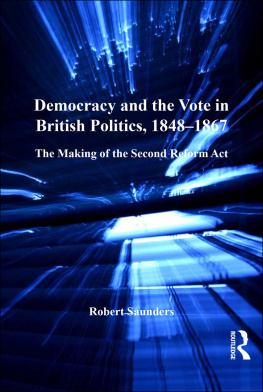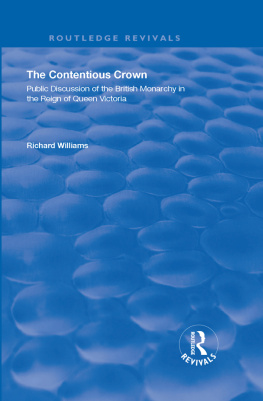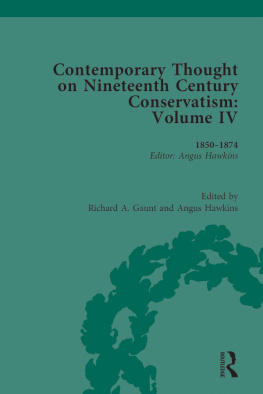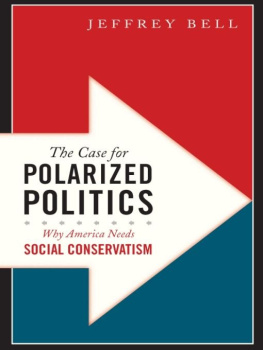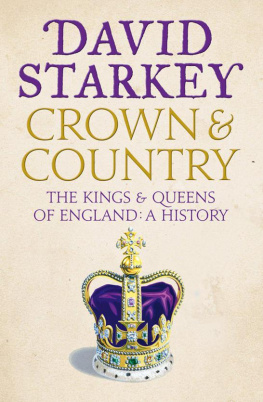Crown, Church and Constitution
Studies in British and Imperial History Published for the German Historical Institute London
Editor: Andreas Gestrich, Director of the German Historical Institute, London
Volume 1
The Rise of Market Society in England, 10661800
Christiane Eisenberg
Translated by Deborah Cohen
Volume 2
Sacral Kingship between Disenchantment and Re-enchantment
The French and English Monarchies, 15871688
Ronald Asch
Volume 3
The Forgotten Majority
German Merchants in London, Naturalization and Global Trade, 16601815
Margit Schulte-Beerbhl
Translated by Cynthia Klohr
Volume 4
Crown, Church and Constitution
Popular Conservatism in England, 18151867
Jrg Neuheiser
Translated by Jennifer Walcoff Neuheiser
CROWN, CHURCH AND CONSTITUTION
POPULAR CONSERVATISM IN ENGLAND, 18151867

Jrg Neuheiser
Translated by Jennifer Walcoff Neuheiser

Published in 2016 by
Berghahn Books
www.berghahnbooks.com
German edition 2010 Vandenhoeck & Ruprecht GmbH & Co. KG
English edition 2016 Jrg Neuheiser
Originally published in German in 2010 as Krone, Kirche und Verfassung Konservatismus in den englischen Unterschichten 18151867 by Vandenhoeck & Ruprecht GmbH & Co. KG, Gttingen
All rights reserved. Except for the quotation of short passages for the purposes of criticism and review, no part of this book may be reproduced in any form or by any means, electronic or mechanical, including photocopying, recording, or any information storage and retrieval system now known or to be invented, without written permission of the publisher.
Library of Congress Cataloging-in-Publication Data
A C.I.P. cataloging record is available from the Library of Congress.
British Library Cataloguing in Publication Data
A catalogue record for this book is available from the British Library
ISBN 978-1-78533-140-4 hardback
ISBN 978-1-78533-141-1 ebook
CONTENTS
PREFACE
This book is a translation of Krone, Kirche und Verfassung: Konservatismus in den englischen Unterschichten 18151867, which was published in 2010 by Vandenhoeck and Ruprecht. The English edition has been slightly shortened and revised, but on the whole, the content is the same as it was when originally published. This translation has been made possible by the prize Geisteswissenschaften International, generously awarded by the Brsenverein des Deutschen Buchhandels. Many thanks are due to all the institutions sponsoring the prize, which include the Fritz Thyssen Foundation, the VG WORT and the German Federal Foreign Office.
I am also grateful to my German publisher, Vandenhoeck and Ruprecht, especially Margarita Wolff, and the editors at Berghahn Books for all their help. Special thanks go to Andreas Gestrich, Director of the German Historical Institute in London, for his constant support in making this translation possible. Moreover, I had the great pleasure to work with Jennifer Walcoff Neuheiser, a translator whose language skills and meticulous care for a good English text were amazing. In case anyone is wondering, she also happens to be my wife.
The German preface acknowledged the help of many friends and scholars whose support, advice and critique made the work on this book such a great experience. It is wonderful to have a chance to thank them again. They include my PhD supervisors in Cologne, Hans-Peter Ullmann and Andreas Fahrmeir (now in Frankfurt); my friends and colleagues Willibald Steinmetz, Detlev Mares, Michael Schaich, Aribert Reimann and Andreas Pear; and a number of other colleagues who might or might not remember my name but who were important for me at some point during my research: Jon Lawrence, Antony Taylor, Philip Salmon, Steven Farrell, Matthew Roberts, Hans-Christoph Schrder, Rudolf Muhs, Andreas Rdder, Domenik Geppert, Mark Willock, Mike Rapport and Vera Nnning. I also wish to thank Frank OGorman whose work I very much admire his devastating critique of my initial expos nearly ended the whole project. However, it survived and in some way or other probably profited from his comments.
Most of the research for this book was done in the Newspaper Reading Room of the British Library in Colindale which has since been closed. The lengthy months spent in darkened rooms at microfilm readers were brightened up by my landlady, Mandy OKeeffe, who made my research trips to London such a pleasure. My thanks also go out to all the staff in the many libraries and archives that I visited. Most of their names can be found in the bibliography at the end of this book; only a few must be named here, in particular the university libraries in Cologne, Mainz and Tbingen as well as the Staatsbibliothek in Berlin.
It is a great pleasure to finally celebrate the publication of the English edition of this book. The original German version was well-received by German specialists on British history; however, I am grateful that this study is now available to a much wider English-speaking audience.
Jrg Neuheiser
Tbingen, April 2015
INTRODUCTION
Why was there no revolution in England in the nineteenth century? What can account for the remarkable stability of English society compared to others in Europe and its ability to go through profound processes of change without erupting in volatile conflicts or succumbing to the violent overthrow of state institutions? In the century following the French Revolution, England was no less confronted by the challenges of modernity than other European societies. Phenomena such as industrialization, urbanization, population growth and democratization, to name just a few, were experienced in England and throughout Europe at roughly the same time. At the end of the nineteenth century, England had a population of about thirty million; around 1800, its population had been less than nine million. In 1901, more than two-thirds of the population lived in cities, most of which had doubled, tripled or even quadrupled in size in a very short amount of time. In centuries prior, only about 27 per cent of the population lived in cities. Fewer and fewer people worked on the land as jobs in trade, transport and industry became more prevalent. By the end of the Napoleonic Wars, England had officially become the greatest economic power in the world. Less than 3 per cent of the population was enfranchised at the beginning of the century, but by 1900 almost every adult man could vote and be elected to Parliament. No other nation in Europe had experienced a similar social, economic and political transformation without a complete restructuring of its state.
It is important to bear these questions and facts in mind when embarking on an analysis of political culture among the English lower classes in the nineteenth century. Looking at the conservative aspects of this culture helps clarify why the massive social conflicts that were rife in England in the nineteenth century did not escalate as they did in other countries. This is not to say that England followed a Sonderweg (special path) to modernity. A long tradition of popular conservatism by itself cannot explain the absence of an English revolution in the nineteenth century. Yet the aspects of popular conservatism analysed in this book point to the complexity of political conflicts in Britain and the variety of ways in which England could face its social challenges. Plebeians, like all other social groups, interpreted their world and the changes that they experienced and endured very differently. Many sought stability by holding tightly to positions that opposed rapid change or promised a safe path into the future without the disappearance of traditional structures. Consequently, it was rather difficult, if not completely impossible, to turn these plebeians into the bearers of revolutionary ideals.
Next page




